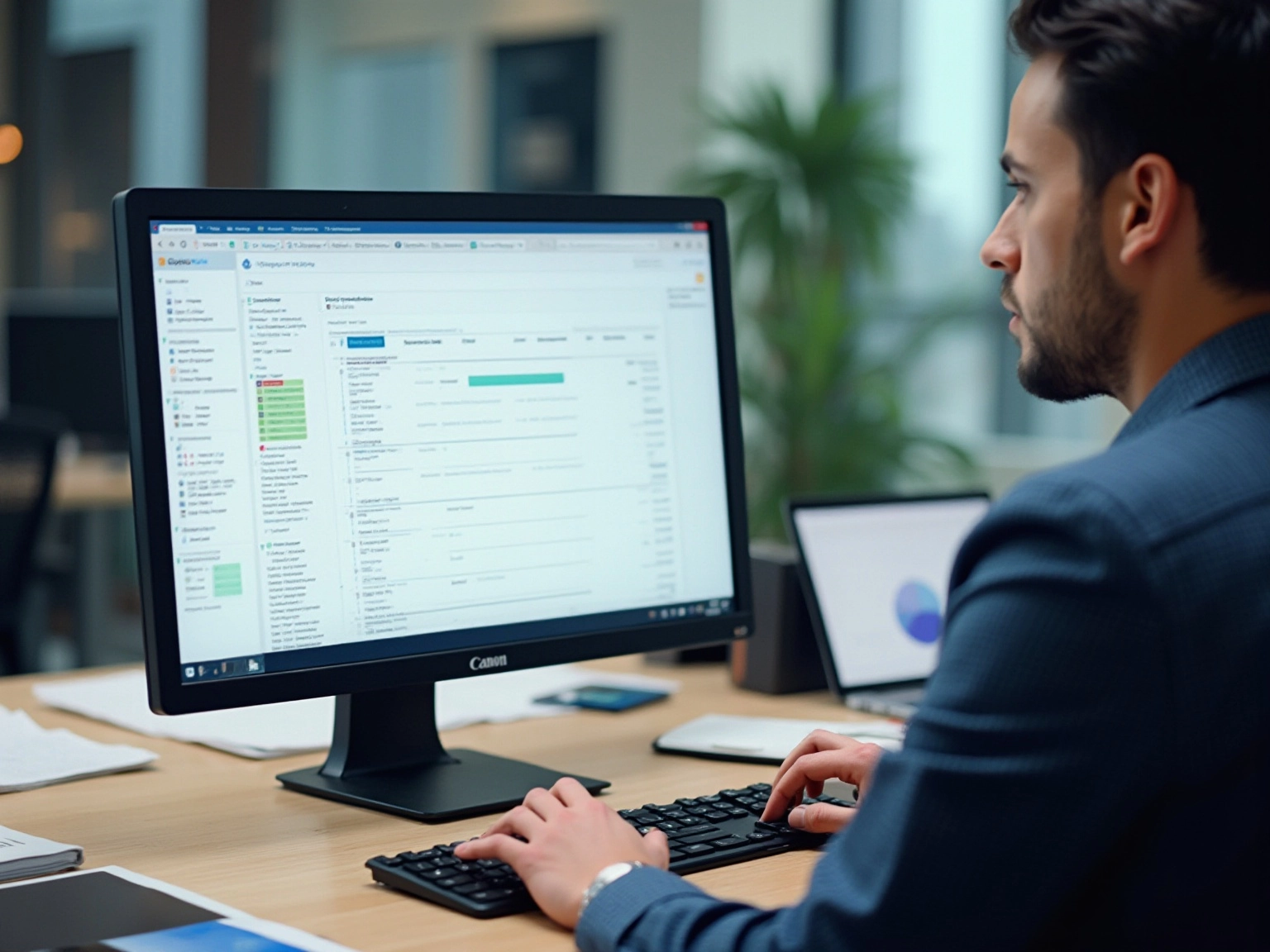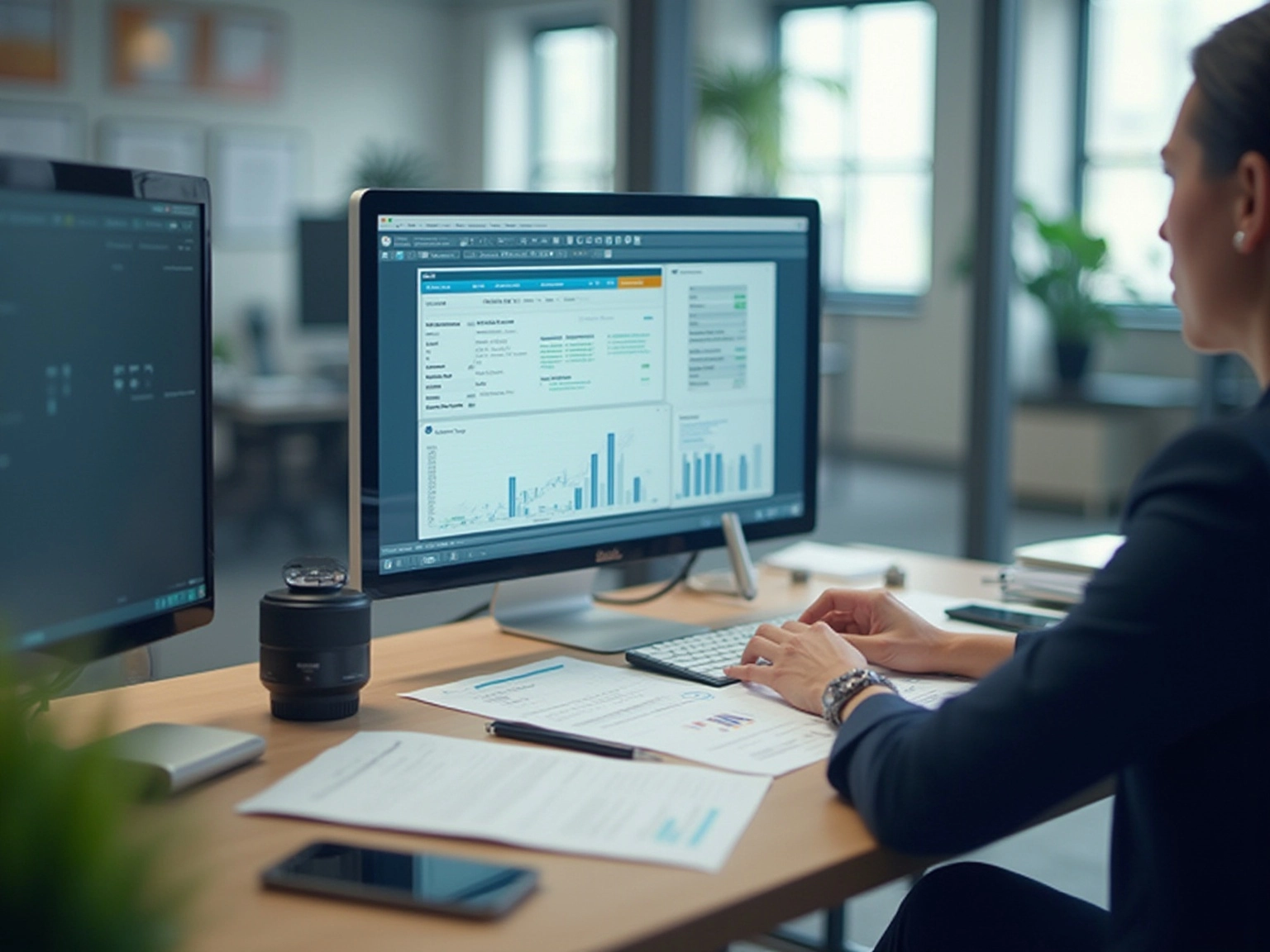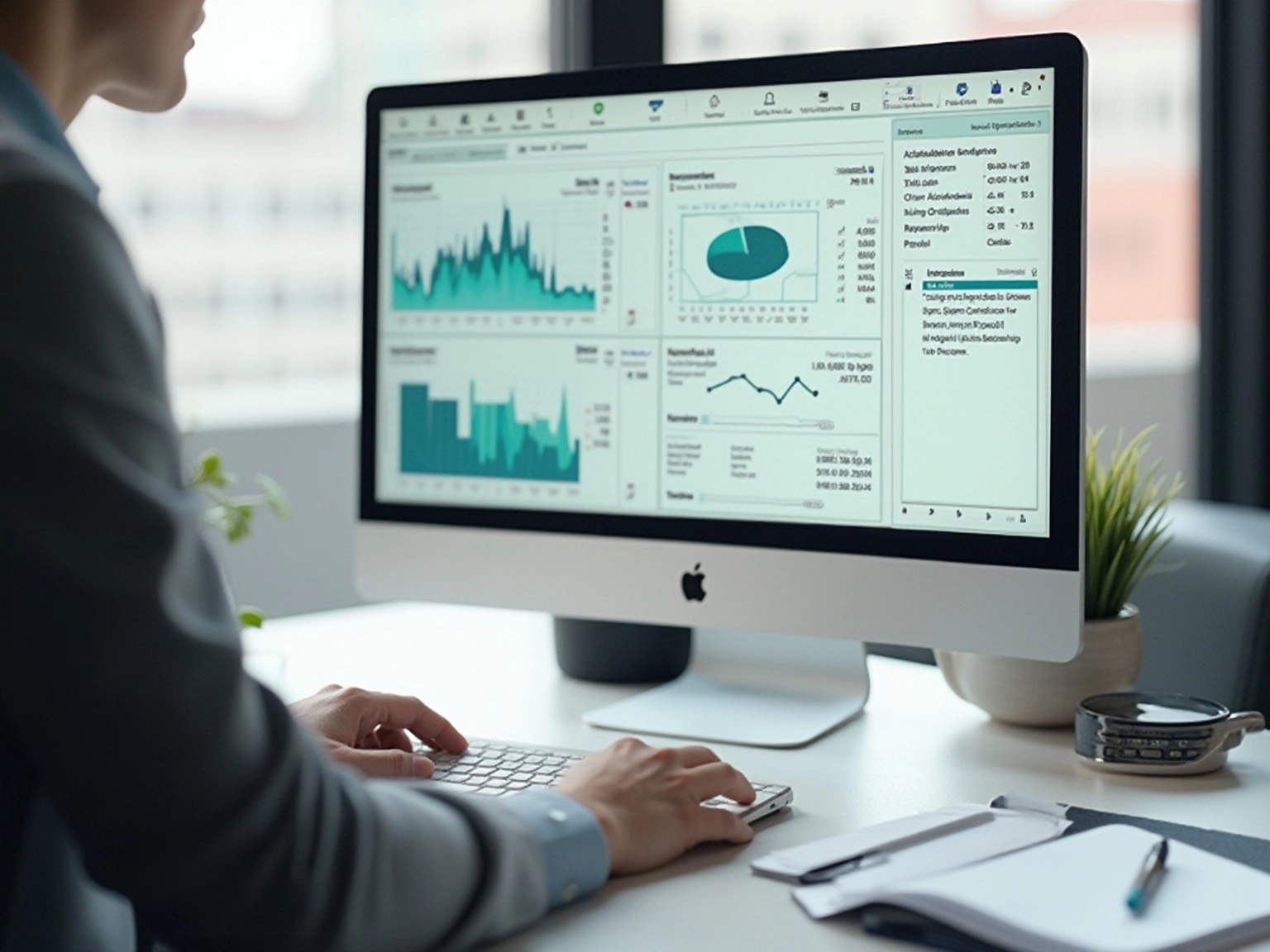Overview
Best practices for utilising payroll and accounting software for UK accountants are paramount in today’s fast-paced financial environment. Automating financial processes not only streamlines operations but also ensures compliance with ever-evolving regulations. Selecting user-friendly systems like Glasscubes significantly enhances operational efficiency, making it essential for accounting managers to adapt. This article underscores the critical role of:
- Integration
- Real-time reporting
- Ongoing training
These elements collectively lead to improved accuracy and heightened client engagement. Ultimately, these strategies result in substantial time savings and an increased return on investment. By embracing these practices, accounting professionals can navigate challenges effectively and elevate their service quality.
Key Highlights:
- Payroll and accounting software automate financial processes, improving efficiency and compliance.
- Glasscubes exemplifies effective software with features like automated reminders and real-time reporting.
- Companies enhancing compensation integrations report a 131% return on investment.
- Only one in three payroll professionals plans to invest in new systems, indicating a cautious approach to technology adoption.
- Real-time reporting is crucial for informed decision-making and customer responsiveness.
- UK accountants face challenges like tax regulation compliance and talent acquisition, with 67% of firms concerned about recruitment.
- Integrating payroll with accounting systems reduces manual errors and improves financial performance insights.
- Automation in payroll processes is essential, with 70% of employees reporting decreased satisfaction from payroll errors.
- Choosing the right software requires assessing needs, user-friendliness, and integration capabilities.
- Compliance with UK regulations is supported by software that updates automatically with legislative changes.
- AI and cloud-based software are transforming payroll and accounting, enhancing data security and operational flexibility.
- Regular training and system customisation are key to maximising software effectiveness.
- Engaging with industry trends and experts is vital for accountants to remain competitive.
Introduction
In the dynamic realm of finance, payroll and accounting software have become indispensable allies for accountants striving to boost efficiency and ensure compliance. These advanced tools not only automate intricate processes but also deliver real-time insights, empowering professionals to make swift, informed decisions.
As firms navigate the complex landscape of tax regulations and client expectations, the integration of sophisticated solutions like Glasscubes is crucial. With features tailored to streamline communication and enhance client engagement, the right software can revolutionise the operations of accountants, resulting in substantial time savings and heightened client satisfaction.
Yet, despite these evident advantages, numerous firms hesitate to embrace such innovations. This article explores the pivotal role of payroll and accounting software in contemporary practices, examining the challenges confronted by UK accountants while providing insights into best practices for optimising software efficiency.
Understanding Payroll and Accounting Software: An Overview
Payroll and accounting software have become indispensable tools for modern finance professionals, designed to automate and simplify a wide array of financial procedures. These systems not only streamline the management of employee compensation and tax calculations but also guarantee compliance with regulatory requirements. Essential functionalities such as real-time reporting, automated calculations, and seamless integration capabilities are crucial for professionals aiming to enhance their operational efficiency.
Glasscubes exemplifies how innovative software can elevate payroll processing and financial reporting. By leveraging its user-friendly interface, accountants can concentrate on strategic tasks instead of being bogged down by manual processes. With features like automated reminders that prompt clients for information, real-time reporting that offers clear visibility on outstanding requests, and secure, encrypted communication, Glasscubes significantly reduces response times and improves client interaction.
Indeed, organisations that enhance their compensation integrations have reported an impressive 131% return on investment, highlighting the financial benefits of embracing advanced technology solutions like Glasscubes.
Glasscubes provides various pricing plans, including:
- The Essential Plan at £120 per month
- The Professional Plan at £180 per month
- The Advantage Plan at £360 per month
Each plan is tailored to meet different business needs. Furthermore, Glasscubes complies with stringent standards, including ISO 27001 and GDPR, ensuring that all data remains secure and adheres to regulatory requirements.
Despite these evident advantages, a recent study revealed that only one in three payroll professionals intend to invest in new payroll systems within the next year, indicating a cautious approach toward adopting innovative technologies, including AI, in payroll processing. This hesitance may prevent firms from fully capitalising on the efficiencies that modern applications, such as Glasscubes, can offer.
Moreover, the importance of real-time reporting cannot be overstated. It empowers financial professionals to access up-to-date financial information, facilitating informed decision-making and prompt responses to customer inquiries. As the HR & Payroll Software Publishing market in the UK continues to evolve, with moderate market share concentration led by companies like IRIS Debtco Ltd, the trend towards automation and efficiency in financial processes is unmistakable.
Incorporating payroll and accounting software can significantly enhance operational efficiency and improve customer satisfaction, as demonstrated by tools like Glasscubes. By automating routine tasks and providing a secure platform for collaboration, financial professionals can dedicate more time to value-added services, ultimately fostering stronger relationships with customers and driving business growth. The South East’s access to tech companies further underscores the necessity of adopting such innovative solutions to remain competitive in the market.
Additionally, Glasscubes offers a user-friendly onboarding process and dedicated customer success support to ensure that users maximise the value of their investment.

Addressing the Unique Challenges Faced by UK Accountants
UK financial professionals face a myriad of challenges, particularly in navigating intricate tax regulations, managing diverse client accounts, and ensuring compliance with evolving financial laws. The implementation of Making Tax Digital (MTD) has introduced additional hurdles, compelling financial professionals to utilise tools that seamlessly integrate with HMRC systems. This transition not only requires technical adaptability but also places significant pressure on firms to provide timely and accurate financial information to clients.
By 2025, the landscape for professionals in the UK is further complicated by a substantial talent acquisition challenge, with 67% of firms identifying it as a primary concern. This figure rises to 82.4% among mid-sized firms, underscoring the urgent need for effective recruitment strategies. Notably, 40% of new staff select a practise over competitors based on its reputation, highlighting the competitive landscape for attracting talent.
As companies adapt, many are intensifying their focus on early career hiring, driven by a shift in employee priorities towards flexibility and work-life balance.
To address these challenges, tools like Glasscubes that offer automated reminders and real-time updates are essential. These tools not only streamline communication but also enhance data management, enabling accountants to shift from administrative tasks to more strategic advisory roles. For instance, firms leveraging Glasscubes’ automated communication and information-gathering capabilities can overcome the inefficiencies of lengthy email threads, ensuring that all team members have access to the necessary information without redundancy.
This transition is crucial, as over 50% of accounting leaders anticipate significant shifts in the industry over the next 30 years, emphasising the need for comprehensive payroll and accounting software solutions.
Moreover, the pressure to comply with tax regulations is evident, as illustrated by case studies showcasing the challenges firms face in adapting to MTD requirements. These challenges underline the importance of adopting comprehensive payroll and accounting software solutions that not only facilitate compliance but also enhance overall efficiency. As Helen Lovering, an Associate Director, observes, many accounting professionals are increasingly attracted to smaller organisations where they can cultivate a broader skill set and enjoy greater career progression opportunities in a less corporate environment.
This trend reflects a growing recognition of the necessity for adaptability and innovation in response to regulatory demands, particularly as regional disparities in salary and costs may result in a decline in trainee intakes.

Integrating Payroll with Accounting Systems for Enhanced Efficiency
Integrating compensation management with payroll and accounting software is essential for enhancing operational efficiency within accounting practices. By automating the synchronisation of compensation data with payroll and accounting software, firms can eliminate manual data entry, significantly reducing the risk of errors. Integration platforms such as Xero and BrightPay enable the automatic posting of wage journals directly into the accounting system.
This seamless integration not only streamlines workflows but also equips accountants with real-time insights into financial performance, empowering them to make informed decisions swiftly.
Current trends indicate that in 2023, 48% of companies resorted to cutting pay to manage expenses, with small and medium-sized businesses being particularly affected—50% of these businesses reduced pay compared to 38% of large enterprises. This emphasises the critical need for precise compensation management, as 7 in 10 employees who experience payment errors report lower job satisfaction, negatively affecting overall morale and productivity. The case study titled “Job Satisfaction and Payroll Mistakes” highlights this issue, underscoring that compensation accuracy is crucial for maintaining employee morale and satisfaction.
Moreover, integrating payroll and accounting software systems can yield substantial benefits. Companies that improve their compensation integrations have reported a remarkable 131% return on investment. This integration not only improves efficiency but also fosters a more organised approach to financial management.
As noted by Sophie Montgomery from TaxAssist Accountants, firms can save significant time during tax season, reporting an impressive 288 hours saved in just one tax season. To ensure successful integration, financial professionals should prioritise compatibility between their selected applications and dedicate time to properly configure the integration, thereby maximising its potential benefits.

Choosing the Right Payroll and Accounting Software: Best Practices
Selecting the appropriate payroll and accounting software is a pivotal decision for financial professionals, demanding a thoughtful evaluation of essential elements. Initially, professionals must assess their specific needs regarding payroll and accounting software, considering factors such as client base size, payroll complexity, and desired automation levels. A user-friendly interface is paramount, as it directly influences efficiency and user satisfaction.
For instance, Glasscubes features an intuitive design that minimises the learning curve and enhances productivity, facilitating seamless adaptation for teams without extensive training.
Customer support is another critical aspect; reliable assistance significantly affects the overall experience with the software. Glasscubes provides dedicated onboarding support and various assistance options, ensuring accountants receive the necessary help to maximise the programme’s potential. Additionally, integration capabilities with existing systems must be evaluated to guarantee seamless operations and data flow.
Conducting comprehensive research is essential. Accountants should read reviews, seek peer recommendations, and examine case studies that illustrate the tool’s effectiveness in real-world situations. For example, firms using Glasscubes have reported an impressive 40% increase in customer response rates and a 50% reduction in response times—outcomes directly attributable to features like automated reminders and centralised interactions. Furthermore, Sophie Montgomery from TaxAssist Accountants highlighted an extraordinary 288 hours saved in just one tax season, underscoring the tangible benefits of utilising Glasscubes.
Many software providers offer free trials, enabling accountants to explore functionality and determine whether the software aligns with their needs before committing financially. Accountants should specifically seek trials that allow them to test features akin to those provided by Glasscubes, which streamline customer communication and information gathering. Glasscubes offers several subscription options, including monthly and yearly plans, starting at £120 per month for the Essential Plan, which encompasses unlimited requests and storage. As the market for payroll and accounting software is projected to reach £11.8 billion within the next eight years, it is crucial for financial professionals to stay informed about the latest trends and best practices for selecting compensation and accounting tools in 2025, enhancing their operational efficiency and client interactions.

Ensuring Compliance: How Software Supports Regulatory Adherence
Adhering to UK compensation regulations is paramount for financial professionals, and leveraging advanced software solutions like Glasscubes is essential to achieving this goal. Many compensation systems are designed to automatically update in response to legislative changes, such as tax rate adjustments and new reporting requirements. For instance, platforms like IRIS and ADP feature built-in compliance checks that proactively alert users to potential issues, enabling financial professionals to address them before they escalate into significant problems.
This proactive approach not only mitigates the risk of penalties but also ensures that clients remain compliant with HMRC regulations.
The importance of automatic updates in payroll and accounting software cannot be overstated. These updates guarantee that accountants utilising payroll and accounting software are consistently equipped with the latest regulatory information, which is critical in an environment where compliance requirements are continually evolving. Moreover, regular training on software capabilities is vital for maintaining effective compliance.
As highlighted by industry specialists, the integration of AI in accounting practices is increasingly beneficial, particularly in areas such as anti-money laundering compliance and customer communication. A recent Sage survey identified customer communication, data analysis, and compliance monitoring as leading applications for financial professionals, underscoring the potential of AI to enhance compliance efforts.
Statistics indicate that a substantial number of firms encounter compliance challenges, with projections suggesting that approximately 23.2% of firms may be non-compliant. This underscores the necessity for financial professionals to utilise robust payroll and accounting software as compensation management tools that not only streamline processes but also bolster compliance with regulations. The adoption of solutions like Glasscubes, which includes an automated reminder system, has resulted in a 50% reduction in response times and a 38% increase in customer engagement, demonstrating the efficiency gains achievable through effective payroll and accounting software.
The automated reminder function empowers financial professionals to send up to 10 notifications on a straightforward schedule, or an unlimited number with advanced options, ensuring timely communication with customers. By personalising messages for each reminder, financial professionals can convey greater urgency for upcoming deadlines, further enhancing customer engagement. By embracing comprehensive solutions, financial professionals can navigate the complexities of compliance more adeptly, ensuring their practices align with current regulations and best practices.
The unique value proposition of Glasscubes lies in its ability to optimise workflows, enhance customer satisfaction, and facilitate seamless communication, establishing it as an indispensable tool for financial professionals striving to elevate their compliance support.
Leveraging Automation: Streamlining Payroll and Accounting Processes
Automation is revolutionising financial and accounting procedures, empowering professionals to optimise workflows and minimise manual tasks through the use of payroll and accounting software. Key features of such software, including automated salary calculations, tax filings, and client reminders, not only save substantial time but also significantly diminish the likelihood of errors. Platforms like Gusto and QuickBooks serve as exemplary payroll and accounting solutions, allowing accountants to automate recurring tasks, ensuring that payments are processed accurately and punctually without the need for manual intervention.
Nevertheless, many firms encounter challenges, such as the time-consuming nature of collating information across multiple email threads and the lack of visibility in audit processes. The impact of automation on compensation processes is profound. Research indicates that 70% of employees who experience mistakes with payroll and accounting software report decreased job satisfaction, underscoring the critical importance of accuracy in payroll management.
By implementing automated solutions like Glasscubes, which offers automated reminders and real-time reporting, firms can enhance employee satisfaction and overall productivity. Glasscubes facilitates a comprehensive and organised response from customers, ensuring that all correspondence is contained within each audit request, thereby eliminating the risk of misplaced or missed responses in busy inboxes.
To fully harness the advantages of automation, financial professionals should conduct regular reviews of their processes to identify areas ripe for automation. This proactive approach not only liberates valuable time for strategic planning and customer engagement but also aligns with current trends in the accounting industry, where over 90% of small and medium-sized businesses are considering payroll and accounting software, alongside AI and automation services, to strengthen their competitive edge. Moreover, the implementation of automated reminders can significantly enhance communication with customers.
By ensuring timely follow-ups, accountants can improve response rates and reduce the time spent on administrative tasks. Users like Sophie Montgomery from TaxAssist Accountants have reported saving an impressive 288 hours during just one tax season, thanks to the streamlined communication and real-time visibility provided by Glasscubes. This shift towards automation is not merely a trend but a necessary evolution in accounting workflows as we progress through 2025.
Additionally, Glasscubes is secure, encrypted, and GDPR compliant, providing peace of mind for companies and customers alike. Research shows that access to payroll and accounting software can significantly influence employee satisfaction, with 82% of employees feeling their employer cares about their health, further highlighting the importance of integrating this technology into payroll processes.
Enhancing Client Engagement Through Effective Software Solutions
Effective customer engagement is paramount for accountants, and the strategic implementation of software solutions like Glasscubes can significantly enhance this aspect of their practice. Glasscubes’ user portals empower individuals to securely submit documents and respond to requests, thereby improving communication and minimising delays. The integration of automated reminders and notifications keeps customers informed about critical deadlines and requirements, fostering a proactive relationship that enhances overall engagement.
Research indicates that personalised experiences dramatically increase customer interaction, with 80% of individuals more likely to engage with firms that offer tailored services. However, fewer than 25% of businesses currently possess the technology to deliver consistent personalisation, presenting a substantial opportunity for accounting firms to distinguish themselves through effective communication tools. Moreover, dedicated onboarding assistance from Glasscubes aids accounting firms in streamlining communication and enhancing information gathering, ensuring individuals are well-supported from the outset.
By leveraging these advanced tools, accountants can not only elevate their service delivery but also cultivate trust and loyalty among clients. This proactive approach fosters long-term partnerships, as evidenced by testimonials from users like Sophie Montgomery of TaxAssist Accountants, who reported saving an impressive 288 hours in just one tax season. Furthermore, firms utilising platforms like Glasscubes have experienced a remarkable 40% increase in customer response rates and a 50% reduction in response times, underscoring the transformative impact of Glasscubes’ portals on accountant-customer communication.
Significantly, over 95% of service interactions can be addressed through digital and STP channels, highlighting the effectiveness of these digital tools in enhancing customer engagement.
Discover how we transform customer engagements in just 4 minutes! Watch our on-demand demo to see how we streamline information gathering:
- Get faster, higher-quality responses from customers.
- Avoid workload bottlenecks and delays.
- Save hundreds of hours of effort.
In summary, the adoption of Glasscubes’ client portals not only streamlines communication but also significantly enhances engagement, making them an invaluable asset for professionals aiming to improve their client relationships and operational efficiency.
Maximising Software Efficiency: Practical Tips for Accountants
To enhance the effectiveness of payroll and accounting software, financial professionals must adopt several best practices. Regular training sessions are essential; they ensure that all staff members are proficient in utilising the application’s features effectively. This ongoing education not only enhances individual skills but also fosters a culture of continuous improvement within the firm.
For instance, a firm that advanced 30% of its developers to the next level of expertise within half a year through personalised learning journeys underscores the significance of customised training programmes.
Personalisation is another crucial element; financial professionals should leverage the application’s customisation features to adapt it to their unique workflows. Glasscubes provides the capacity to personalise the portal with your organisation’s branding, enabling firms to showcase the file-sharing platform as an extension of their own technology. Additionally, the Enterprise Edition of Glasscubes removes all references to Glasscubes altogether, offering even greater branding flexibility.
This tailored approach significantly enhances usability and can lead to more efficient processes. For example, integrating payroll and accounting software with other tools, such as Customer Relationship Management (CRM) systems, can streamline operations and enhance data accuracy, ultimately leading to improved decision-making.
Furthermore, it is crucial for accountants to regularly assess their application usage and actively seek feedback from team members. This practice helps identify areas for improvement and ensures that the firm is maximising its investment in technology. By adopting these strategies, accounting firms can not only enhance their operational efficiency but also improve customer satisfaction through timely and accurate service delivery.
Sophie Montgomery from TaxAssist Accountants noted that effective application use can lead to substantial time savings, reporting an impressive 288 hours saved in just one tax season.
Incorporating statistical insights can further bolster these practices. For example, firms that have embraced regular training and customisation have reported significant improvements in their operational metrics. One notable case study revealed that a firm experienced a 40% increase in client response rates after implementing a structured training programme for their accounting system.
Such evidence highlights the importance of investing in staff development and system optimisation to achieve superior outcomes in accounting practices. Additionally, understanding distribution shapes in performance data can reveal important insights about application behaviour, allowing firms to investigate performance anomalies and improve application efficiency by addressing the causes of varied latency. By measuring the effectiveness of training and usage improvements through statistical significance, firms can ensure they are on the right path to maximising their efficiency.
To see Glasscubes client portals in action, we encourage you to view a demo.

The Future of Payroll and Accounting Software: Trends to Watch
The landscape of payroll and accounting software is undergoing a rapid transformation, driven by several pivotal trends reshaping the industry. A prominent trend is the increasing integration of artificial intelligence (AI) and machine learning, significantly enhancing data analysis capabilities and automating complex tasks. Firms leveraging AI technologies have reported marked improvements in efficiency, with some accounting teams experiencing up to a 50% reduction in time spent on data entry and reconciliation processes.
Moreover, the shift towards cloud-based payroll and accounting software continues to gain momentum, offering accountants unparalleled flexibility and accessibility. This transition allows for real-time collaboration and data sharing, crucial in today’s fast-paced business environment. In fact, a recent survey indicated that 38% of organisations globally have adopted a hybrid in-house/outsourced payroll model, reflecting a growing preference for integrated solutions that combine the best of both worlds. This model not only improves operational efficiency but also enables firms to adjust to evolving customer needs more effectively.
As firms increasingly prioritise data security and compliance, the emphasis on protecting sensitive customer information has never been more critical. The number of payroll departments making payments between paydays has more than doubled, underscoring the need for robust systems that can handle such complexities while ensuring compliance with regulatory standards. This highlights the importance of adopting advanced technologies like payroll and accounting software, such as Glasscubes, which optimises workflows and enhances client satisfaction through its user-friendly interface and automated features, including automated communication tools and real-time reporting.
To remain competitive, financial professionals must stay informed about these evolving trends. Engaging with industry experts, such as those participating in upcoming webinars, can provide valuable insights into the challenges and opportunities that lie ahead. For instance, a complimentary webinar led by payroll MD Julie Lally and regulatory analyst Claire Warner on January 13 will tackle significant compensation challenges for 2025, providing a platform for financial professionals to acquire insights on navigating the future landscape.
Claire Warner emphasises, “Our payroll professionals are prepared to address the significant challenges for payroll in 2025, and this webinar will be a crucial resource for financial experts looking to stay ahead.”
By embracing these advancements and understanding their implications, accountants can leverage new technologies like Glasscubes to enhance their practices and better serve their clients, ultimately positioning themselves for success in an increasingly digital world.

Conclusion
The integration of payroll and accounting software stands as a critical pillar for accountants navigating the complexities of the financial landscape. By automating intricate processes and providing real-time insights, tools like Glasscubes not only enhance operational efficiency but also significantly elevate client satisfaction. The capacity to streamline communication, ensure compliance, and facilitate timely responses empowers accountants to pivot towards strategic advisory roles, moving beyond mere administrative tasks.
However, despite these evident benefits, a significant reluctance persists among firms to fully embrace these innovative solutions. This hesitancy can stifle their potential to thrive in an increasingly competitive market. It is imperative for accountants to recognise that adopting advanced software is not simply a trend; it is a necessity for meeting client expectations and regulatory demands.
As the accounting industry continues to evolve, staying informed about emerging technologies and best practices will be essential. The future is promising for those who harness automation and integration to optimise their workflows. By prioritising efficient software solutions, accountants can not only enhance their service delivery but also foster stronger relationships with clients, ultimately driving business growth and resilience in a rapidly changing environment.
